Daily Business Report-April 27, 2020
Photo credit: Juliana Kozoski
The 10 Most Expensive Cities in the World
From Osaka to New York, Visual Capitalist looked at a global ranking of the 10 most expensive cities, and how those rankings have changed over the last year.
Where personal wealth is concerned, there are two sides to every story. The first of which is the amount of money a person earns, and the other is what they choose to spend their money on.
The latter is influenced by the cost of living in the city where they reside—an ever-changing metric that is driven by a wide variety of factors, such as currency, population growth, or external market movements.
Today’s graphic visualizes the findings from the 2020 Worldwide Cost of Living report and uses data from 133 cities to rank the most expensive cities in the world.
Note: Report research was conducted towards the end of 2019, before the COVID-19 outbreak.
Click here to view the rankings
_______________________________
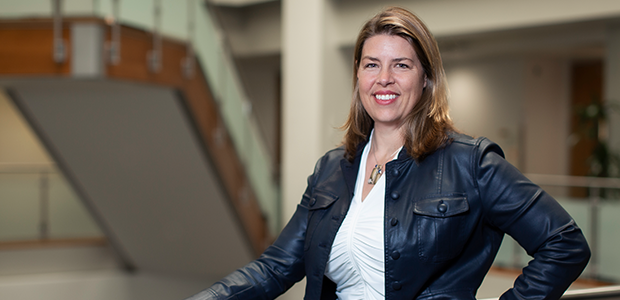
La Jolla Institute for Immunology researcher
receives $100,000 grant for COVID-19
San Diego researcher Erica Ollmann Saphire, a professor at the La Jolla Institute for Immunology (LJI), has received $100,000 through the Emergent Ventures Fast Grants program to fuel research into how antibody therapeutics can treat COVID-19.
Antibody therapeutics will likely be a critical tool for protecting frontline health care workers and those at most risk of SARS-CoV-2 infection. Antibody-based immunotherapies could also treat those who have already been infected, reducing the severity of the disease and improving survival.
Saphire will use the new funds to purchase incubators to grow vaccine antigens and antibodies from human cells. This equipment will join a new LJI Board-funded arsenal of incubators to produce molecules needed for structural biology and by complementary efforts of the institute’s larger COVID-19 Task force, which includes Shane Crotty, Alessandro Sette, Bjoern Peters, Sujan Shresta, and Pandurangan Vijayanand.
“This is a permanent advance in infrastructure,” says Saphire. “With both sets of instruments, LJI is equipped for high-level production for this pandemic and all the other diseases we study.”
The funding will also support the needs of the Coronavirus Immunotherapy Consortium (CoVIC), launched by the Bill and Melinda Gates COVID-19 Therapeutic Accelerator Platform.
_______________________________
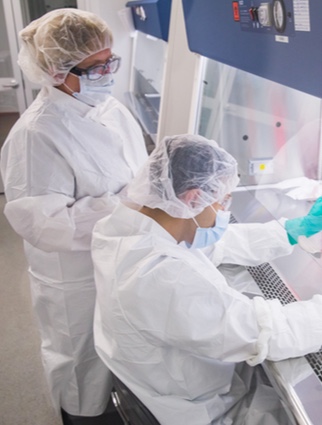
Poway biotech files for FDA approval of its
coronavirus stem cell treatment application
Poway-based biotech Personalized Stem Cells Inc. (PSC) and its parent company, VetStem Biopharma, have filed an expedited review request for an Investigational New Drug (IND) application with the FDA for the treatment of COVID-19 patients with stem cells.
The first trial is named “CoronaStem 1” and will provide treatment for 20 hospitalized COVID-19 patients with serious complications.
Recent news stories from Israel, China, and the U.S. show promising effectiveness of stem cells to treat the major medical lung issues of COVID-19 patients, according to PSC Medical Director Dr. Christopher Rogers. “I believe this is the most promising therapy being explored by medical scientists at this time and stem cells may potentially reduce the most serious complications of coronavirus infection,” said Rogers.
“Stem cell doses will be ready for clinical trial use in May, depending on FDA approval,” said PSC CEO Dr. Bob Harman. “The first trial will be conducted in a limited number of patients hospitalized for COVID-19 as outlined in the FDA submission, but compassionate use approval could allow for many more patients to be treated. PSC is not soliciting patients for enrollment at this time due to the limited number of hospitals to be included in the CoronaStem 1 study.”
_______________________________
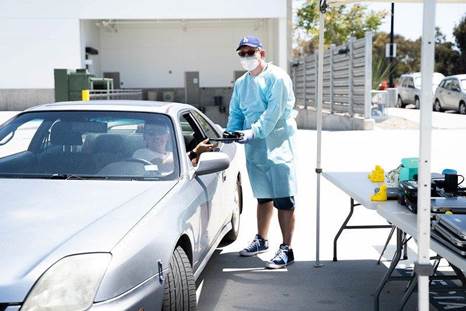
San Diego Foundation’s $500,000 grant to be used
to purchase laptops for community college students
Approximately 1,400 community college students in San Diego County who are in need of laptops and Internet connectivity for online classes will benefit from a $500,000 grant from The San Diego Foundation’s COVID-19 Community Response Fund.
The grant, which was proposed by San Diego Community College District (SDCCD) Chancellor Constance Carroll, will be shared among the five community college districts in San Diego County that are part of the San Diego & Imperial Counties Community Colleges Association.
More than 200,000 students in total are enrolled in those five districts – Grossmont-Cuyamaca Community College District, MiraCosta Community College District, Palomar Community College District, San Diego Community College District (for City, Mesa, and Miramar colleges, and Continuing Education), and Southwestern Community College District.
Chancellor Carroll said the grant money will be distributed immediately and that each district is currently determining which students will be eligible.
Colleges throughout the region have been distributing hundreds of laptops to students, many of whom are struggling to support themselves and their families. Still, more help is needed. Community colleges enroll among the most diverse population of higher education students in the country, approximately half are receiving some form of financial assistance, and too many are struggling to keep up with the transition to online classes because of the digital divide – a divide exacerbated by library closures that limit student access to computers and Wi-Fi.
_______________________________
San Diego communications company offers small
businesses free access to its flagship service
San Diego-based communications company VOXOX has launched a Small Business Emergency Communication Plan that grants free access to its flagship service VoxDirect, a cloud-based text and voice marketing/notification system, to help support small businesses during this unprecedented crisis.
The special emergency response package is a $69 a month value being offered at no charge so small businesses can use VoxDirect by VOXOX’s virtual text marketing and notification tools, along with the integrated cloud-based mobile-first phone system for businesses, to instantly notify customers and employees of important announcements and special offers, enable a seamless work-from-home experience, lower costs, and connect with loyal and potential new customers during a time when typical communication and marketing methods are no longer effective or relevant.
Eligible small businesses are those with 25 or fewer employees. The plan will be available to micro and small businesses as long as they need support during the effects of COVID-19.
When we say it’s free, we mean totally free with no strings attached, no credit card required, no contracts, and no back-end ‘gotcha,’” said Larry Wallace, president of VOXOX’s VoxDirect division. “This is our way of using what we have to help those who are in need.”
_______________________________
COVID-19’s true origins
The novel coronavirus is “totally consistent with a jump of a species from an animal to a human,” to put it in the words of Dr. Anthony Fauci, director of the National Institute of Allergy and Infectious Diseases.
But how and where, exactly, did the jump occur? The latest episode of the I AM BIO Podcast explores the “deeper, disturbing truth about the pandemic’s origin” with a fascinating expert on zoonotic disease.
First: What’s a zoonotic disease? A disease that jumps from animals to people due to things like the speed of population growth, the disruption to natural habitats, and the “disregard we’re showing for wild animals not meant to be captured, caged, and eaten,” said BIO President & CEO Jim Greenwood.
And now, 75 percent of infectious diseases are linked back to animals—and they’re increasing. “As we expand our frontiers, we’re exposed to more of these viruses…in nature,” said Dr. William Karesh of the EcoHealth Alliance, a world-renowned expert on zoonotic disease transmission.
Do we know if COVID-19 came from a bat for sure? Yes. Dr. Karesh explains where scientists have found similar SARS viruses in bats—and how humans have much more contact with bats in the wild than we realize.
And between .5 percent to 3 percent of people tested already have antibodies to this group of viruses—which means “these bat viruses are getting into people all the time,” he continued. It’s just that most don’t travel or cause serious illness.
He sets the facts straight on bats and this virus—explaining how the coronavirus might have gotten into humans, why we actually need bats for agriculture and sustainable forestry, and why illegal wildlife trade is a problem even in the United States. (You’ll never believe what customs inspectors have found in the mail.)
He also talks about how we can reduce the threat of zoonotic disease in the future, and as you probably already guessed, One Health—exploring the links between people, animals, and the environment—is key.
The bottom line: “COVID could be just the tip of the iceberg in a new infectious era if humanity doesn’t wake up to the gravity of this threat and resolve to change our ways,” said Jim. Luckily, Dr. Karesh has some ideas about what we can do next.
Listen to the podcast at http:www.bio.org/podcast or wherever you get your podcasts including Apple, Google, and Spotify.
_______________________________
Genalyte expands laboratory services
offering with acquisition of BaseHealth
Genalyte, a next-generation lab service company focused on decentralizing diagnostic testing, has acquired BaseHealth, a Bay Area health care data analytics company. The combined company will provide onsite, rapid diagnostics with data analytics capabilities to enable the health care system to test and treat patients faster and more accurately than the incumbent lab service industry, according to Genalyte.
Genalyte’s mission is to improve patient outcomes by providing health care practitioners the accurate and rapid diagnostic information they need to make health decisions while the patient is sitting in front of them. BaseHealth specializes in advanced data analytics that incorporate all available health information about the patient, including diagnostic tests, in order to maximize the accuracy and utility of the test.
“By combining these capabilities at the point-of-care in real time, we are creating the safest, most accurate and most impactful patient interaction possible. When we do our job right, patients receive better, faster, more cost effective health care,” said Cary Gunn, CEO at Genalyte.
The combined company will have operations in San Diego and Silicon Valley as well as Austin, Texas.
_______________________________
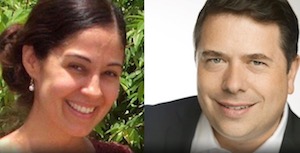
MiraCosta College approves two new
campus leadership positions
MiraCosta College has approved two new administrators for leadership positions within the Community Learning Center and overseeing Continuing and Community Education.
Mitra De Souza, an experienced student affairs leader who is passionate about fostering environments where diversity flourishes, is the new director of student services. John Makevich has joined MiraCosta College as the Dean of Continuing and Community Education.
The director of student services is a new position and De Souza’s role is designed to evolve based upon CLC needs. Currently, she is serving as the student conduct officer, manages the Noncredit Student Success and Support Program (NCSSP), as well as managing the Campus Assessment, Resources, and Education (CARE) team, supervising student referrals, where she focuses on expanding follow-up services to work more closely with students who are faced with multiple barriers to their success.
Mitra has over 20 years of experience in higher education.
John Makevich was the dean of the School of Personal and Professional Learning at College of the Canyons before coming to MiraCosta College, where he provided oversight of educational programs serving students looking for an entry point into higher education, as well as students seeking to get retrained for new opportunities.
Makevich has experience providing leadership for local, regional, and statewide projects in adult education, career education, and online education. He brings almost ten years of experience in the online education domain.
_______________________________
Dan Moore elected president of San Diego
County Credit Union Holiday Bowl
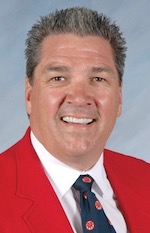
The San Diego County Credit Union Holiday Bowl’s board of directors has elected Dan Moore president of the 2020 Holiday Bowl. He succeeds Paul Hering.
Moore joined the Holiday Bowl committee in 2005. In 2011 he was recognized as the organization’s most valuable volunteer, and in 2013 became a voting member of the board of directors. He has chaired the team selection committee and has been an active member of the bowl’s golf classic committee for 15 years.
Moore grew up in Woodburn, Ore. and received his undergraduate degree from Western Oregon University, and his master’s degree from the University of Akron. He moved to San Diego in 1999 and sold luxury homes in Del Mar and La Jolla for Prudential California Realty. In 2009 he transitioned into commercial real estate where he currently works for Crown Pacific Group LLC as a co-manager of a portfolio of commercial and residential properties in San Diego County.
Other 2020 elected officers for the San Diego Bowl Game Association include: Bob Bolinger, president-elect; Cherry Park, secretary; and Jackie Reed, treasurer.
The 2020 SDCCU Holiday Bowl will be played at SDCCU Stadium and match top teams from the Pac-12 and ACC. The date and time for the game has not yet been announced.
_______________________________
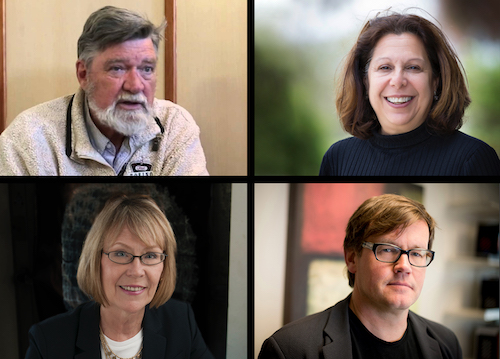
Four from UC San Diego elected
to American Academy of Arts and Sciences
Four members of the University of California San Diego community, including three professors and one vice chancellor, have been elected to the American Academy of Arts and Sciences—one of the oldest and most esteemed honorary societies in the nation.
Paul M. Churchland, Vicki H. Grassian, Margaret S. Leinen and David G. Victor are among the Academy’s 2020 class of 276 members.
Paul Churchland, professor emeritus and former chair of the Department of Philosophy in the Division of Arts and Humanities, is an expert in the philosophy of science, philosophy of the mind, epistemology and cognitive science, philosophy of language and the history of philosophy.
Vicki Grassianis the Distinguished Chair of Physical Chemistry, who currently serves as the chair of the Department of Chemistry and Biochemistry in the Division of Physical Sciences and also as a faculty member within the Department of Nanoengineering and Scripps Institution of Oceanography.
Margaret Leinenis UC San Diego’s vice chancellor for marine sciences, dean of the School of Marine Sciences and the director of Scripps Institution of Oceanography. Leinen is an award-winning oceanographer and an accomplished executive with extensive national and international experience in ocean science, global climate and environmental issues, federal research administration and more.
David Victoris the Center for Global Transformation Endowed Chair in Innovation and Public Policy and professor of international relations at the School of Global Policy and Strategy. He serves as co-director of the Laboratory on International Law and Regulation and UC San Diego’s Deep Decarbonization Initiative. Victor’s research interests are in energy policy and energy markets—the future role of natural gas, electric power market reform and rural energy development.



